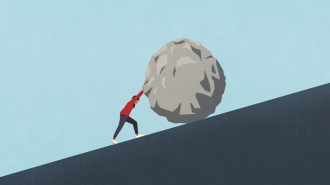Rich caveman, poor caveman: Economic inequality wasn’t born last election cycle
By Matt Crenson
- More than 2 years ago
Any serious assessment of America’s rising economic inequality must consider the decline of manufacturing, globalization in labor markets and tax policies that allow rich people to keep more of their investment winnings.
But where’s the fun in that? For those of us who like our history with a bit more mystery, the really interesting question is how human societies became unequal in the first place.
The classic interpretation blames the origin of agriculture. Anthropologists have found that hunter-gatherer societies like those that predated the agricultural revolution distribute resources more or less equally among their members.
But growing crops allowed people to settle down, making it easier to accumulate property. Bountiful harvests produced surpluses that had to be distributed by administrators. Failed harvests facilitated the rise of chieftains and military leaders who could keep the peace and wrest food from neighboring groups.
That all sounds plausible, but a number of archaeological discoveries over the last few decades suggest it may not actually be how things went down. At sites like Göbekli Tepe in Turkey and Hayonim Cave in Israel, people were living in fixed settlements, building monuments and distinguishing themselves from one another by their possessions well before they were coaxing wheat plants to produce ever bigger kernels. It may even be that inequality was necessary for the development of agriculture, instead of the other way around.
So what did motivate people to organize themselves into societies where some people assented to taking a smaller piece of the pie? Anthropologists tend to favor the development of sociocultural institutions like inheritance, which would allow people with more resources to pass those advantages on to their offspring. Those advantages wouldn’t necessarily have to consist of material wealth: Social connections, good genes or valuable knowledge could also give certain lineages a leg up.
Researchers of a game-theoretic bent argue that inequality actually encourages people to cooperate in situations where equal players would choose to go it alone. Take the prisoner’s dilemma, a game with three possible outcomes: A player wins big if he takes advantage of an opponent who fails to do the same to him, both parties win a moderate payoff if they cooperate, or both get nothing if each tries to take advantage of the other. If everyone is equal, each player’s best strategy is to try to take advantage.
But if the rewards are adjusted so that some players get bigger or smaller payoffs depending on where they sit on a chessboard-like grid, cooperative groups develop around the most powerful players. You could imagine that in the real world, these power centers would cluster in areas of especially rich resources.
So how would those stratified societies spread beyond their own private Edens? There’s no reason people should prefer to live in unequal societies. In fact, unequal societies today tend to be less happy and healthy than equal ones. And archaeologists find that early agricultural groups were smaller and more prone to disease than their more egalitarian hunter-gatherer counterparts.
But a social arrangement doesn’t have to benefit anybody to proliferate. Last year in PLoS ONE, Stanford researchers described a computer simulation of an imaginary world inhabited by both unequal and equal societies. In most circumstances the unequal societies spread much more readily than the equal ones, and took over the world. The big difference between the two kinds of groups seemed to be how they coped with hard times. When food ran low in equal societies, everyone suffered. If things got bad enough, everyone starved to death. But unequal societies coped very differently with food shortages. The poor began dying off much sooner in those societies than they would in an egalitarian situation, as the rich ensured their own survival by taking a bigger share of the shrinking food supply. The rich, as a result, could last longer than they would have in an egalitarian society.
The researchers also allowed groups to light out for new territory whenever things got bad. With an abundance of impoverished masses, unequal societies spawned migrations much more readily than groups where everyone got an equal share. Except in a few special circumstances, stratified groups had taken over every corner of the researchers’ simulated world in a few thousand years.
The PLoS ONE paper doesn’t try to tackle what might have happened when migrants tried to take over already occupied territories, but it’s not hard to imagine what kind of society would fare better when a rivalry turned violent.
On their own, game theory and computer simulations will never tell us exactly what happened thousands of years ago. But these thought experiments are a valuable reminder that societies often do well by exploiting their weakest members.
SN Prime, February 13, 2012 | Vol. 2, No. 6







